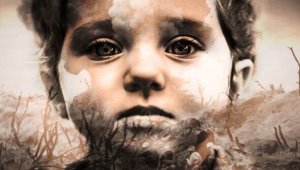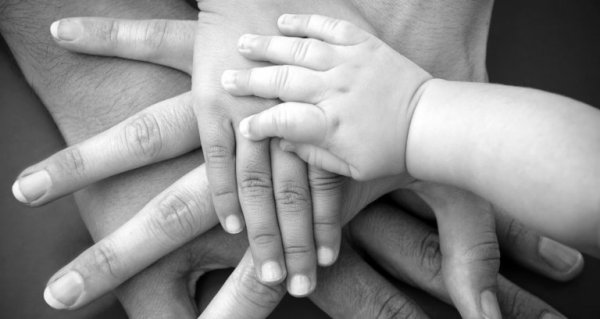What is Transgenerational Trauma?


Written and verified by the psychologist Valeria Sabater
Transgenerational trauma is the transference of emotional, physical, or social pain from one person to their descendants. It goes much deeper than just learned behavior. We are talking about epigenetics. It’s about how environmental influence can change the expression of certain genes.
It’s not new. In fact, the concept of transgenerational or intergenerational trauma originated in the decades after WWII. It was then that various studies proved that children and grandchildren of Holocaust survivors demonstrated certain symptoms of trauma. Nightmares and emotional and behavioral problems showed that the original trauma of the grandparent or parent had far-reaching effects.
“The mind develops like the body through internal growth, the influence of the environment, and education. Its development can be inhibited by physical ailments or trauma.”
-Umberto Eco-
All of that is determined by child-rearing style and education. The conscious or subconscious memory and narrative that surrounds the family dynamic also plays a role. Here, the past continues to make itself present in different ways.
Nevertheless, it can have much farther reaching effects. It can even, as we mentioned, have repercussions on a genetic level.
For example, think about the consequences of malnutrition. Let’s also consider the genetic impact that fear and suffering can have due to elevated levels of cortisol. Over the course of several years, these elevated levels can wreak havoc on the body.
Unmanaged and repressed trauma almost always result in post-traumatic stress and chronic depression.
The descendants of the person who suffered the original trauma will not necessarily develop the same disorders. They will, however, be much more vulnerable than other people to anxiety, stress, and depression. Let’s look at this subject more closely…

One example of transgenerational trauma
Andrea was sexually abused by a relative over a significant part of her childhood and adolescence. She grew up in an unstructured environment. Her mother also mistreated as a child.
Once she turned eighteen and was able to leave, she refused psychological help to deal with the trauma. She just wanted to forget and close that chapter of her life as soon as possible.
The scar that the experience left her with was still very much present in her life. She suffered from anxiety, eating disorders, low self-esteem, hypervigilance, depression, and insomnia. In addition to all of that, she had a fragile immune system that made her more susceptible to infection, colds, allergies, etc.
Andrea now has a 7-year old son. He is her whole world. Because of her son, she had reason to find stability and strength and take care of herself much better. Nevertheless, she is realizing that it’s getting harder and harder to raise her son.
He isn’t sleeping well, he has attention problems, he throws a lot of tantrums, and he’s being rebellious. When the school calls her, Andrea feels like they are judging her ability to be a mom. She clearly feels that she is “doing something wrong.”

Unconfronted trauma and its effect on genetics
The last thing that Andrea should be doing is doubting her role as a mother. Peter Loewenberg is a psychohistorian, and professor at the University of California.
He is one of the foremost experts in the study of transgenerational trauma. He explains that unconfronted grief and trauma impact later generations in many different ways.
- We can’t forget, for example, that elevated levels of cortisol in the blood during pregnancy affect the development of the fetus itself. In fact, as psychobiologist Bea Van Den Bergh showed, experiencing high levels of stress and anxiety during this period can “program” certain biological systems in the fetus. This makes the baby predisposed a variety of illnesses and emotional disorders.
- On the other hand, as Peter Loewenberg explains, unconfronted grief or unmanaged trauma is a sort of neuronal “short circuit.” It actually alters our DNA in a way that unknowingly traps our descendants in a kind of collective and unconscious solidarity with the original trauma.
Epigenetics and transgenerational trauma
We all learned in biology that we get our genes from our mother and father. They teach us that those genes determine our physical traits, our intelligence (to some extent), and even our tendency to inherit certain diseases.
However, accepting that trauma is written onto the very chromosomes of a family line is hard to swallow.
Epigenetics made a significant qualitative leap from more orthodox genetics to explain this phenomenon. The first is that our lifestyle, the environment we live in, our diet, and even certain traumatic events can generate genetic changes in our descendants.
That is explained by a small chemical “label” called the “epigenome.” What this infinitesimal element does is fascinating. It modifies the expression of certain genes depending on the above variables.

Various scientists at Mount Sinai Hospital already showed that the effects of post-traumatic stress in Holocaust survivors activated the epigenome capable of altering the genetic expression of the person. Holocaust survivors passed on this traumatic mark in different ways to subsequent generations.
However, transgenerational trauma doesn’t mean that the pain experienced by our parents or grandparents will 100% determine who we are. It means that we have a higher possibility of suffering depression, anxiety, sleep disorders, emotional problems, hyperactivity…
Something that Andrea should do is learn proper ways to deal with her past so she can overcome her trauma. The strength that she will gain from this process will allow her to be her best self for her son. That way she can give him what he needs and help him with his behavior. She can raise him into a happy, strong, and emotionally mature man.
This text is provided for informational purposes only and does not replace consultation with a professional. If in doubt, consult your specialist.








